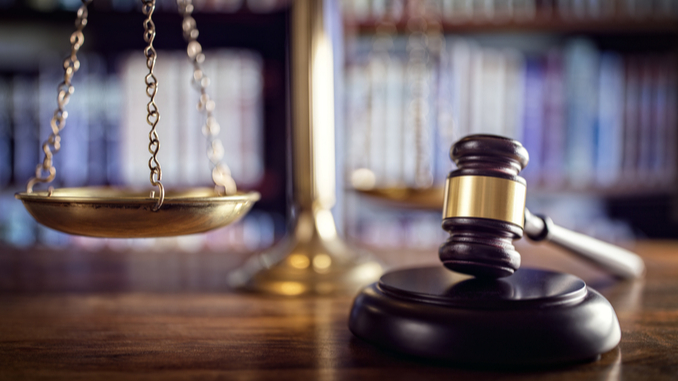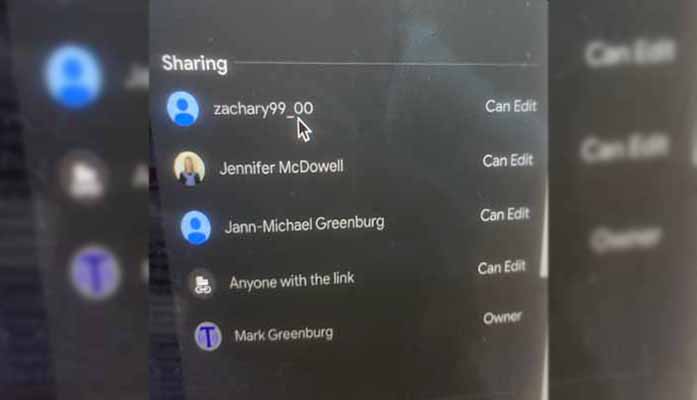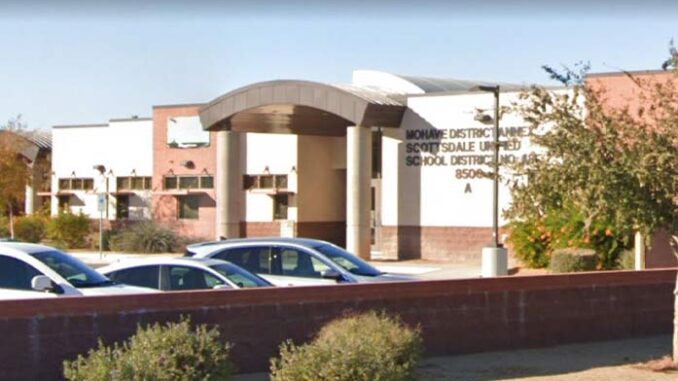
by Terri Jo Neff | Nov 15, 2021 | News
By Terri Jo Neff |
With tech companies like Intel and NXP Semiconductors located within its city limits, it is not surprising that Chandler is Arizona’s first municipality to conduct a mock election to test a mobile voting system using blockchain technology.
Chandler residents ages 13 and older have until Nov. 30 to download Voatz on a mobile device and then register via an encrypted system. A vote can then be cast in a fake special bond election, with city officials announcing the vote counts on Dec. 1 during a livestreamed event at Chandler City Hall.
Whether voters and city officials find an app like Voatz “valuable and viable” is part of the motivation for the mock election, according to Chandler Vice Mayor Mark Stewart. There will also be an opportunity for residents to comment on the process and the results will be audited.
However, there are no plans at this time for the city to utilize such a system for actual elections, Stewart has said.
Chandler, which is the fourth most populous city in Arizona, prides itself as the Community of Innovation. Among the mock election’s selling points is its timing right after the Maricopa County Recorder’s Office conducted Chandler’s official Nov. 2 special bond election.
“Chandler is a technology hub and we’re constantly looking at innovations in the way we deliver services,” according to the city’s website. “This pilot is intended to offer the City insight regarding a mobile voting process and gauge interest among residents to determine if a mobile voting option is desired in the future.”
Not only does the mock election give residents a different way to vote, it also provides voters an opportunity test a new technology and compare voting methods without any potential negative impact on an actual election.
Public records show the city’s interest in mobile voting dates back several years, leading to a budget amendment in Fiscal Year 2020 to research blockchain technology applications. The city clerk and city attorney then held discussions with election officials in other states which had utilized mobile voting.
As to how Voatz came to be involved with Chandler’s test election, the city’s website notes the Boston-based company has experience using blockchain technology for mobile voting services in actual elections. Voatz was also willing to offer a demonstration pilot.
City officials are highlighting the state-of-the-art encryption techniques used with the Voatz program, including end-to-end encryption for secure data transmission as well as secure data storage. The city’s website notes that the Maricopa County Recorder’s Office twice turned down offers to participate in a mock election to better understand the technology, so the city council voted to sponsor the event.
“This pilot is intended to offer the City insight regarding a mobile voting process and gauge interest among residents to determine if a mobile voting option is desired in the future,” according to the website. “Today, voters can mail in their ballot, drop it off at a voting center or complete a ballot at a voting center. This test of the technology offers experience if mobile voting were to become another option in the future.”
Chandler residents ages 13 and older who have not yet participated in the mock election may still download the app via Google Play or App Store. Additional information and a tutorial in English and Spanish is available at https://www.chandleraz.gov/government/elections-and-voting/blockchain-mobile-voting

by Corinne Murdock | Nov 15, 2021 | Education, News
By Corinne Murdock |
After a court ruling against them earlier this month, Maricopa County Community College District (MCCCD) honored the religious exemptions of two students who objected to the use of fetal cell lines to develop, test, and produce the COVID-19 vaccine. The two nursing students, Emily Thoms and Kamaleilani Moreno, were needing to complete clinical rotations to finish their final semester of MCCCD’s nursing program. Thoms and Moreno were given their requested 36 hours of capstone experience in clinical care, scheduled to begin and end in time for their expected graduation date next month.
In court, MCCCD argued that a blanket rejection of religious exemptions was necessary for their nursing program due to the vaccination requirement of some of their clinical partners and their program’s random assignment of clinical rotations. U.S. District Judge Steven Logan rejected that rationale based on the arguments of Thoms and Moreno: their lawyer pointed out that MCCCD gave similar accommodations to other students for both religious and non-religious reasons.
Logan asserted that Arizona’s Free Exercise of Religion Act (FERA) was enacted to prevent the very choice that MCCCD was forcing Thoms and Moreno to make.
The burden imposed here by denying Plaintiffs their nursing degrees […] cannot be characterized as ‘trivial, technical, or de minimis.’ […] By denying Plaintiffs their nursing degrees, Defendant prevents them from becoming licensed and employed as nurses. They will be unable to join the profession to which they have devoted themselves for the past two years. Given the time and money that Plaintiffs have invested in their nursing education, Defendant’s Policy undoubtedly places substantial pressure on them to modify their behavior in violation of their beliefs. Plaintiffs are faced with the choice of, on the one hand, compromising their religious beliefs to complete their clinicals and graduate as expected […] or, on the other, adhering to their beliefs and giving up the nursing degrees to which they are otherwise entitled and all their associated benefits for the indefinite future.
Another argument MCCCD presented was the claim that Thoms and Moreno were only facing a temporary delay, not complete removal from the program. However, they couldn’t guarantee when, if ever, Thoms and Moreno could complete the program. The ability for Thoms and Moreno to finish relied on clinical placement with a partner that didn’t require vaccination: a future contingency which MCCCD couldn’t guarantee completely. Logan asserted that MCCCD’s inability to decisively ensure completion of the program wasn’t a “mere delay.”
“It is difficult to characterize these circumstances as a mere delay when there is no clear end date when the Plaintiffs will be able to graduate,” ruled Logan.
MCCCD’s prompt compliance with the court order was likely influenced in part by the language of Logan’s ruling. The judge asserted that the harm Thoms and Kamaleilani would’ve experienced under MCCCD would constitute “an injury of the highest order” pertaining to the Constitution’s religious freedoms.
“Plaintiffs have shown a likelihood of success on the merits of both of their claims, that they are likely to suffer irreparable harm absent injunction, and that the balance of equities and the public interest weigh in their favor,” wrote Logan. “Their case is not doubtful, and the harm that they have alleged – the violation of their constitutional and fundamental right to free exercise – is an injury of the highest order under the Constitution and the law. Such an injury cannot be remedied by damages.”
Logan heard the case last month, and issued a preliminary injunction against MCCCD that same week. Logan’s order is reproduced below:
The Court enters a preliminary injunction as follows: 1. Defendant is preliminarily enjoined from enforcing against Plaintiffs its requirements that nursing students satisfy the vaccination policies of their assigned clinical partners and that nursing students must complete their assigned in-person clinical rotations in order to complete their academic programs. 2. Defendants shall make available to Plaintiffs a suitable accommodation that will allow Plaintiffs to satisfy the clinical components of their coursework and complete their academic programs as scheduled in December 2021. IT IS FURTHER ORDERED that the Court exercises its discretion and waives the requirement of a security bond accompanying this preliminary injunction.
Corinne Murdock is a reporter for AZ Free News. Follow her latest on Twitter, or email tips to corinne@azfreenews.com.

by Corinne Murdock | Nov 15, 2021 | Education, News
By Corinne Murdock |
According to the special meeting agenda released on Saturday, the Scottsdale Unified School District (SUSD) Governing Board will consider the election of a new board president in addition to the resignation of their president, Jann-Michael Greenburg, in tonight’s meeting. This latest development comes on the heels of the discovery of a secret Google Drive dossier on parents and other political enemies compiled by Greenburg’s father, Mark Greenburg. It appears from the nature of some of the dossier’s contents that the younger Greenburg may have been aware of the dossier, if not complicit.
Apart from their consideration to remove Greenburg from his presidency and the board entirely, SUSD announced they are investigating a separate issue: whether Greenburg used SUSD resources to access or create the dossier.
The Greenburgs aren’t the only focus of parents and community members’ ire. Some of the victims are alleging that Superintendent Scott Menzel as well as Board Members Zach Lindsay and Julie Cieniawski were equally complicit in the dossier. These allegations come from the original discovery of the dossier by one of the victims, who received a screenshot of the dossier from Jann-Michael in an email also sent to Menzel and Cieniawski. Access permissions were given to Lindsay’s account name, “zachary99_00,” along with Jann-Michael’s account. Mark Greenburg apparently also updated access permissions to allow anyone who had the drive link to access the dossier.
Amy Carney, a Scottsdale mother of five, asserted that SUSD has failed to protect its families.
“Jann-Michael Greenburg is not the only one who must resign from the Scottsdale Unified Governing Board for his bad behavior and involvement in the secretive digital dossier kept on parents and community members. Fellow board members Zach Lindsay and Julie Cieniawski, along with Superintendent Scott Menzel, were also privy to the Greenburg’s Google Drive and must be held accountable for their failure to protect SUSD families,” said Carney. “[Cieniawski and Menzel] were recipients of the email from Greenburg containing the screenshot of the Google drive address and folders. In a subsequent email response, [one of the mothers named] Kim Stafford brought the Google drive to their attention, saying, ‘[T]he fact that you have a Google drive folder with my name on it is, on the one hand, fascinating, on the other disturbing.’”
The dossier has become more than a localized incident between a school board member and parents: law enforcement are also investigating. Scottsdale Police Department (SPD) said in a statement on Saturday that they are looking into the dossier.
“The Scottsdale Police Department is aware of the allegations against Scottsdale Unified School District President Jann-Michael Greenburg,” stated SPD. “We are conducting an investigation into the matter and will report our findings once it is complete. Anyone with information regarding the case can contact the Public Information Office at (480) 312-5562.”
SPD told AZ Free News they couldn’t provide further details on this active investigation.
The board announced the meeting immediately following news of the dossier’s existence.
SUSD’s special meeting will take place at 6 pm in the administration building. Members of the public are welcome to attend in-person, or they may watch the meeting live-streamed on YouTube.
Corinne Murdock is a reporter for AZ Free News. Follow her latest on Twitter, or email tips to corinne@azfreenews.com.

by Terri Jo Neff | Nov 15, 2021 | News
By Terri Jo Neff |
One week after his inauguration, President Joe Biden issued Executive Order 14008 pausing new oil and gas leases on public lands. But perhaps the best known provision of the executive order was the goal of ensuring at least 30 percent of all federal land and coastal waterways are conserved by 2030.
The purpose, according to Biden, is to address climate change, protect biodiversity, and create equitable access to nature.
At the time of Biden’s announcement, about 12 percent of land across America was under sufficient oversight to be considered conserved, according to data from the U.S. Geological Survey. To meet the 30 percent goal would require conservation of about 440,000,000 additional acres.
By comparison, the State of Texas comes in at 171,057,000 acres.
The fact that the federal government already controls roughly 640,000,000 acres would seem to go a long way toward achieving the 30 by 30 goal, now better known as the America the Beautiful Initiative. However, nearly one-third of those acres are not conserved in a way that would likely comply with the unfinalized standards of the initiative.
Back in March, more than 60 members of the Congressional Western Caucus, sent Biden a letter expressing concerns with 30 by 30. The letter noted that with more than 90 percent of federally-managed lands lying west of the Mississippi, their constituents are concerned Western states will be disproportionately impacted by policies utilized to achieve the 30 by 30 goals.
“Stewardship of our lands is embedded in our Western values. Sustainable, healthy land is the lifeblood of our rural communities and our outdoor heritage and rural economies thrive when our lands are properly managed,” the letter stated. “However, the 30 by 30 initiative displays a dangerous thoughtlessness and far too many of our questions have been left unanswered.”
Yet seven months after that letter, very little is known as to how the Biden Administration intends to meet those goals. And that prompted an Oct. 12 letter to the President from Cochise County Sheriff Mark Dannels on behalf of the Arizona Sheriffs Association.
“As in the past, we have concerns including proposals such as these lacking specific measures, imposing unnecessary land use restrictions, and limiting economic opportunities that have existed for decades on these very lands,” Dannels wrote, also noting that federal officials were using the term “federally managed lands” instead of “public lands” in 30 x 30 documents.
But while Arizona’s sheriffs encouraged collaboration with state agencies and local governments to address climate change and drought impacts within the Western States, the letter cautioned that federal officials “should avoid imposing unilateral authority to further limit uses and impose increased land use restrictions on federal lands in the West that have been extremely divisive and controversial.”
Similar letters were sent to Sen. Kyrsten Sinema and Sen. Mark Kelly. A spokeswoman for the Arizona Sheriffs Association said no responses were received in the last month.
Some 30 by 30 documents mention the need for incentivizing voluntary stewardship efforts on private lands and by supporting the efforts and visions of States and Tribal Nations. The fact that privately owned lands are home to nearly two-third of all species on the U.S. Endangered Species list also has landowners in the western United States concerned about preservation of property rights.
“Traditional mechanisms of land protection like permanent acquisition, easement or federal designation will rightfully play a role in achieving 30 by 30,” the Western Landowners Alliance noted in a recent statement. “At the same time, over-reliance on these tools, or an insistence that these mechanisms are the only way to protect land fails to recognize the contributions to conservation of those already on the land.”
Deb Haaland, as U.S. Secretary of Interior, was tasked to coordinate with the Secretarys of Agriculture and Commerce along with the National Oceanic and Atmospheric Administration and White House Council on Environmental Quality to propose guidelines for determining what lands and waters qualify for conservation.
The America the Beautiful Interagency Working Group, as it is known, is also responsible for providing an annual progress report to the White House as well as ensuring federal dollars get distributed toward conservation programs.
The working group came under scrutiny earlier this year after questions were raised about the protocols utilized for awarding $17 million in federally funded grants for urban park projects. One of those projects sent $1 million to the City of Santa Barbara, California to renovate a park, including the installation of synthetic turf at the park.

by Corinne Murdock | Nov 14, 2021 | Education, News
By Corinne Murdock |
Scottsdale Unified School District (SUSD) Governing Board will hold a special meeting on Monday to decide whether Board President Jann-Michael Greenburg must resign over his connection to a secret dossier on parents and other political opponents. Greenburg’s father, Mark Greenburg, was the owner of the Google Drive dossier, and Jann-Michael reportedly had access to it – as evidenced by the listing of his name among those granted access to the drive, and his sending a picture of the drive to one of the parents targeted within it.
As AZ Free News reported Thursday, there are other indicators that Jann-Michael may have had more involvement in the dossier than he’s let on, according to past admissions and discoveries of shared computer activity with his family and the nature of some of the dossier’s contents. On one of the bodycam videos on the dossier taken by Mark Greenburg, Mark is heard saying that he and another, unnamed individual hired a private investigator to spy on parents. Additionally, there were recordings on the dossier in which Jann-Michael and Mark could be heard conversing about Mark’s actions – and Jann-Michael doesn’t question why.
Board Member Dr. Libby Hart-Wells’ requested the special meeting to decide on the resignation of Greenburg. The request came around the same time that over 700 parents, elected officials, lawmakers, and community members signed onto a letter demanding Greenburg’s resignation. The letter is reproduced in its entirety below:
On November 9, 2021, The Scottsdale Independent published an article ‘The Greenburg Files: Is there a file on you?’ demonstrating the expansive and disturbing activities of Scottsdale Unified School District Governing Board President Jann-Michael Greenburg. The ‘Greenburg Files,’ discovered from an email sent directly from Mr. Greenburg’s SUSD email to a former SUSD parent, contains documents specifically surveilling at least 47 community members and numerous others peripherally. Our community is rightfully alarmed. This also comes on the heels of Mr. Greenburg saying, ‘Jesus f****** Christ, you people’ twice during parents’ public comments and disrespecting a requested moment of silence at the August 24, 2021 governing board meeting. As evidenced on the Greenburg Google Drive, during that meeting Mr. Greenburg’s father, Mark Greenburg, was photographing and videotaping children in the parking lot of Coronado High School as they waited to give those public comments stating ‘We’ have hired a private investigator to surveil the parents.
The ‘Greenburg Files’ contain many disturbing documents, audio files, and video recordings of several individuals, including photos of SUSD students. There is no legitimate purpose for any of these background checks, deeds, marital records, financial documents, professional certifications and more to be curated, stored, and shared in such a manner by Mr. Greenburg. The files also contain un-redacted SUSD emails shared with drive editors and viewers and screenshots that included open district email tabs – bringing even more concern that SUSD resources may have been shared or used outside of their intended or legally allowed purposes. Additionally, during the August 17, 2021 Special Governing Board Meeting, Mr. Greenburg admitted to working under the name ‘Mark Greenburg’ on his computer making clear he works under multiple names on his computer.
We are committed to returning excellence, integrity, and trust to our community and the negative and appalling words and actions from this official who was elated to serve this community. We are horrified that such unkind, divisive, and disrespectful behavior has been exhibited against members of our own community, including adults and children.
We believe that hate, harassment, bullying, stalking, and intimidation are not part of SUSD. We seek a restoration of SUSD’s values: Excellence, Integrity, Empathy, Trust, Inclusion, and Unity.
The SUSD Governing Board policies are clear regarding ethics of the board and are outlined by BCA Board Member Ethics. This policy includes: setting positive examples of good citizenship by scrupulously observing the letter and spirit of the laws, rules, and regulations; maintaining a deep sense of social responsibility as a trusted public servant; dedication to the highest ideals of honor, ethics, and integrity in all public and personal relationships; conducting oneself so as to maintain public confidence in the governance of the District and in the performance of the public trust; using the power and resources of public office only to advance public interest, and to not attain personal benefit or pursue any other private interest incompatible with the public good.
We are looking to you to uphold these standards of ethics in spite of Mr. Greenburg’s repeated failure to do so. His actions have made it unequivocally clear that he is unfit for public office. The manner in which you respond will reflect on SUSD and the City of Scottsdale. We stand together in requesting the immediate termination of Jann-Michael Greenburg as SUSD Governing Board President, and we further demand his resignation as an SUSD Governing Board Member.
Signed by other 700 parents, students, teachers, grandparents, alumni, and community members[.]
This latest discovery comes on the heels of a contentious year for Greenburg. In August, Greenburg enjoyed a maskless night at a bar after pushing for mask mandates in his schools. The board president chalked criticism of his decision to not mask up a “baseless attack.”
A few days before that incident, as the demand letter cited, Greenburg uttered an expletive into a hot mic directed at aggrieved parents.
“Jesus f**king Christ, people,” said Greenburg.
In May, Greenburg shut down a meeting over “belligerent parents,” in reference to those parents who’d shown up to discuss or protest masking and Critical Race Theory (CRT) in the district.
The special meeting to determine Greenburg’s continuance on the board is scheduled for Monday, November 15, at 6 p.m. at SUSD’s administration building.
Corinne Murdock is a reporter for AZ Free News. Follow her latest on Twitter, or email tips to corinne@azfreenews.com.

by Corinne Murdock | Nov 14, 2021 | Education, News
By Corinne Murdock |
Maricopa County Community College District (MCCCD) may not prohibit nursing students with a religious objection to the COVID-19 vaccine from completing clinical rotations due to being unvaccinated, according to the U.S. District Court for Arizona. U.S. District Judge Steven Logan issued the ruling Friday, as he’d promised at the hearing on Monday. The two plaintiffs – nursing students Emily Thoms and Kamaleilani Moreno – were granted a preliminary injunction against MCCCD’s vaccination requirement. Thoms and Moreno will be able to complete their nursing programs one way or another, whether by accommodation or through regular clinical rotations, by their scheduled graduation date next month.
“Plaintiffs have shown a likelihood of success on the merits of both of their claims, that they are likely to suffer irreparable harm absent injunction, and that the balance of equities and the public interest weigh in their favor,” wrote Logan. “Their case is not doubtful, and the harm that they have alleged – the violation of their constitutional and fundamental right to free exercise – is an injury of the highest order under the Constitution and the law. Such an injury cannot be remedied by damages.”
While MCCCD claimed that they required universal vaccination due to their clinical partners’ requirements, Logan cited evidence given by the plaintiffs to the contrary. This evidence included MCCCD previously providing similar accommodations to other students for both religious and non-religious reasons: simulated clinicals, extra assignments, finding new clinical sites, and swapping assigned clinic sites requiring vaccination with those that didn’t.
Logan did note that Thoms and Moreno hurt their case by framing the lawsuit as a challenge to a “vaccine mandate,” because MCCCD doesn’t define its vaccine requirements as a mandate. For that reason, Logan modified their request for relief.
“The only vaccine mandates in this case belong to Defendant’s clinical partners, who are not parties before the Court. Rather, Defendant’s Policy is a set of requirements that together, when applied to Plaintiffs, are likely to substantially burden Plaintiffs’ right to freely exercise their sincere religious beliefs in violation of FERA and the First Amendment, to cause Plaintiffs irreparable harm, and to go against the public interest,” wrote Logan.
Both Christians, Thoms and Moreno objected to the COVID-19 vaccine due to its reliance on fetal cell lines during its testing, development, and production.
MCCCD Board Member Kathleen Winn criticized the district’s decision to hire a group of attorneys just to fight two nursing students. She also asserted that the nursing department head lied in court.
When this started back in August the administration could have done what this judge ordered us to do here. Instead we hired 5 attorneys to fight against these nursing students who represent thousands more in our state. The head of our nursing department lied in court, was caught and the judge made the best decision for these students allowing them their religious exemptions. If we appeal we are using taxpayers money to do so. Stand with these nursing students…I am proud of them and the moral courage to put it all on the line for the greater good!
Read the full court ruling here.
Corinne Murdock is a reporter for AZ Free News. Follow her latest on Twitter, or email tips to corinne@azfreenews.com.






